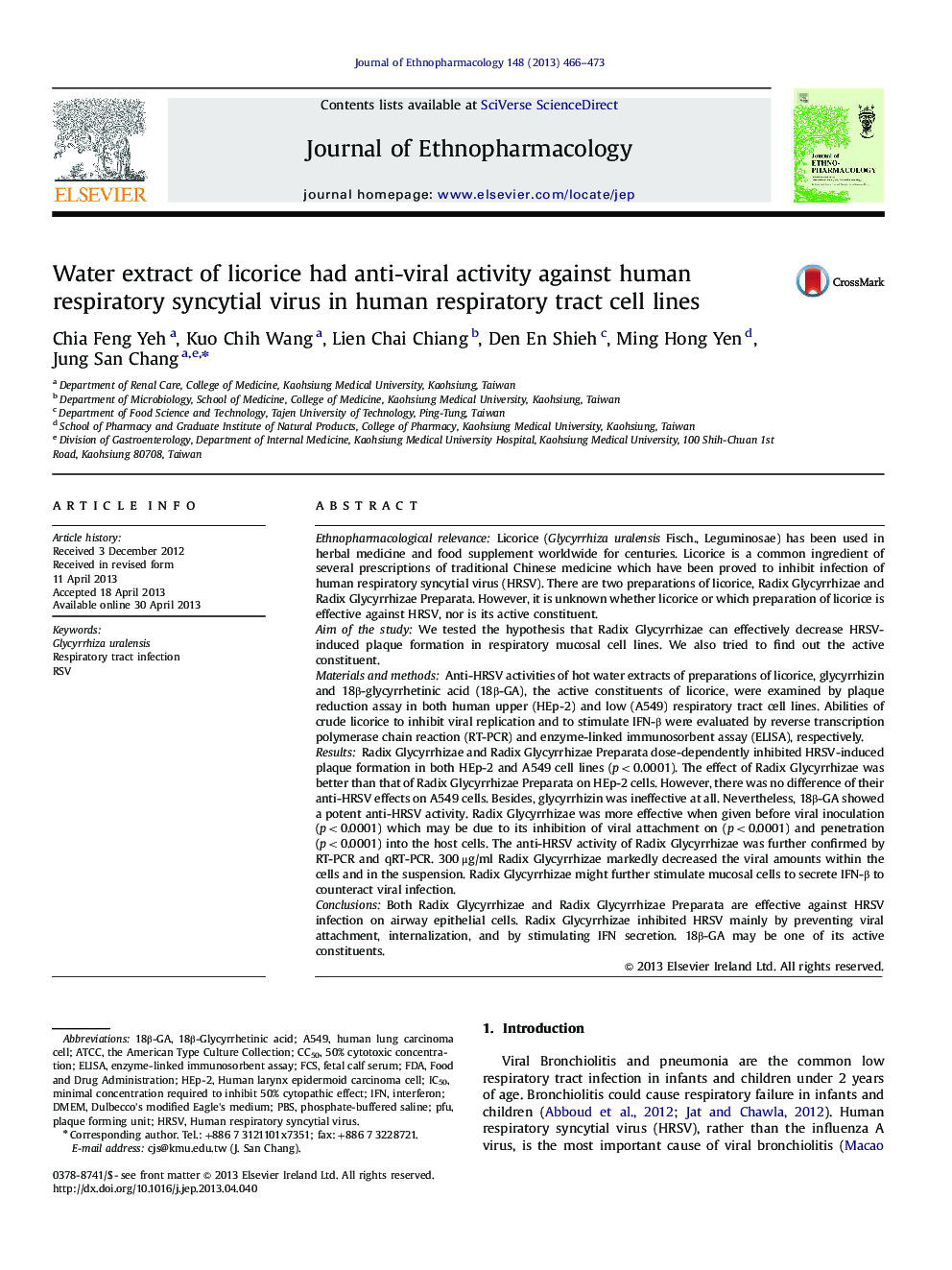| کد مقاله | کد نشریه | سال انتشار | مقاله انگلیسی | نسخه تمام متن |
|---|---|---|---|---|
| 5837129 | 1123958 | 2013 | 8 صفحه PDF | دانلود رایگان |
Ethnopharmacological relevanceLicorice (Glycyrrhiza uralensis Fisch., Leguminosae) has been used in herbal medicine and food supplement worldwide for centuries. Licorice is a common ingredient of several prescriptions of traditional Chinese medicine which have been proved to inhibit infection of human respiratory syncytial virus (HRSV). There are two preparations of licorice, Radix Glycyrrhizae and Radix Glycyrrhizae Preparata. However, it is unknown whether licorice or which preparation of licorice is effective against HRSV, nor is its active constituent.Aim of the studyWe tested the hypothesis that Radix Glycyrrhizae can effectively decrease HRSV-induced plaque formation in respiratory mucosal cell lines. We also tried to find out the active constituent.Materials and methodsAnti-HRSV activities of hot water extracts of preparations of licorice, glycyrrhizin and 18β-glycyrrhetinic acid (18β-GA), the active constituents of licorice, were examined by plaque reduction assay in both human upper (HEp-2) and low (A549) respiratory tract cell lines. Abilities of crude licorice to inhibit viral replication and to stimulate IFN-β were evaluated by reverse transcription polymerase chain reaction (RT-PCR) and enzyme-linked immunosorbent assay (ELISA), respectively.ResultsRadix Glycyrrhizae and Radix Glycyrrhizae Preparata dose-dependently inhibited HRSV-induced plaque formation in both HEp-2 and A549 cell lines (p<0.0001). The effect of Radix Glycyrrhizae was better than that of Radix Glycyrrhizae Preparata on HEp-2 cells. However, there was no difference of their anti-HRSV effects on A549 cells. Besides, glycyrrhizin was ineffective at all. Nevertheless, 18β-GA showed a potent anti-HRSV activity. Radix Glycyrrhizae was more effective when given before viral inoculation (p<0.0001) which may be due to its inhibition of viral attachment on (p<0.0001) and penetration (p<0.0001) into the host cells. The anti-HRSV activity of Radix Glycyrrhizae was further confirmed by RT-PCR and qRT-PCR. 300 μg/ml Radix Glycyrrhizae markedly decreased the viral amounts within the cells and in the suspension. Radix Glycyrrhizae might further stimulate mucosal cells to secrete IFN-β to counteract viral infection.ConclusionsBoth Radix Glycyrrhizae and Radix Glycyrrhizae Preparata are effective against HRSV infection on airway epithelial cells. Radix Glycyrrhizae inhibited HRSV mainly by preventing viral attachment, internalization, and by stimulating IFN secretion. 18β-GA may be one of its active constituents.
157
Journal: Journal of Ethnopharmacology - Volume 148, Issue 2, 9 July 2013, Pages 466-473
